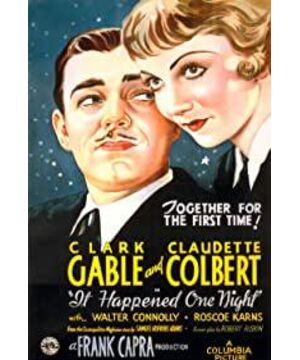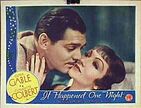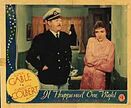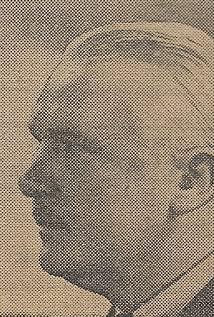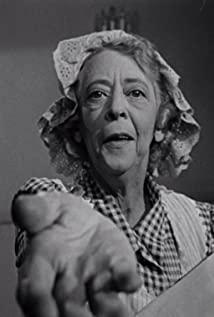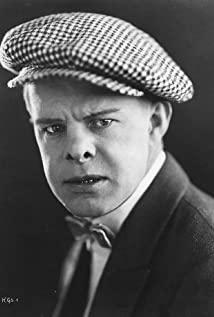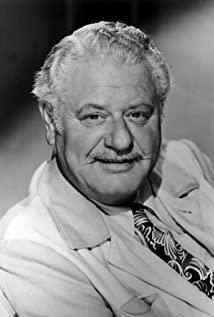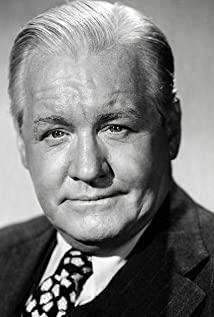It's so beautiful, I love the plot
The following are the notes for watching the main explanation of station b up. Neurocomedy is a kind of comedy, which combines the characteristics of romantic comedy, farce and satire. It started in 1934, marked by one-night romance, and ended in the mid-1950s. The story has a routine, and the protagonists are often a pair of social classes. Different men and women, who don't see each other in the eye at first, but after a series of mishaps, they are forced to cooperate, and after the problem is finally solved, they fall in love. The hallmark of neuro-comedy is machine-gun dialogue and fast-moving plots accompanied by ironic situations, the genre focuses on the comedic effects of various conflicts, conflicts between principles, conflicts between ideas, and conflicts between the sexes . In 1934, the birth of a romantic standard neuro-comedy, no one was optimistic when it was filmed. He was a small-budget film by Columbia. At that time, the company was still unknown. On the last day of shooting, the heroine Colbert complained that it was the worst film she had ever made. The movie, which was initially released in a few theaters, did not get much publicity and the box office was not high. Only in the second round of the release did it get word-of-mouth, especially in small towns. It became a dark horse at the box office and won five top Oscar awards in one fell swoop. Genre films are kind of time capsules that allow us to understand the social, economic, and political circumstances of the time, how various routines developed, and what kind of social circumstances made them popular. One Night's Happening reflected the social trends of the time, and thus laid the cornerstone of neurocomedy. Routine: 1 man vs woman
Gender conflict is often the central driving force in most neurocomedy stories, and it often ends with either the conflict between the male and female protagonists being alleviated, or the conflict has turned into a reason for the two to love each other. Why does conflict between the sexes become the absolute core? In fact, neuro-comedy was born in a period of social upheaval. Women in American society poured into the labor market in large numbers. This is the first time they compete with men in the workplace. The social roles of the sexes are changing, and the gender status of the characters in the overnight romance is interchangeable. Change is to reflect. When the female protagonist wakes up, she has breakfast, and the male protagonist serves her, and he is in a weak position. Witty and fast-paced dialogue, followed by constant tit-for-tat confrontation between the male and female protagonists.
2 city vs country
This is a road trip. The protagonists discover themselves on a journey full of unknowns. The key to the narrative lies in the fact that the protagonists are all from the city. Lord, it is markedly different from the women lining up outside to take a bath. Rural-urban tensions intensified in the early twentieth century, as the U.S. population exploded from 10 million to 54 million from the 1870s to the 1920s, and cities provided the American people with a class pathway and a chance to realize the American Dream. But with it came the rapid pace of life and the absence of traditional American values. In these films, the protagonists start their lives in the emerging American metropolis, and returning to the countryside represents a return to common sense and a tribute to what is truly precious.
3 High class vs low class
Building on the theme of urban-rural confrontation, One Night Love also explores how two people from different social classes entangle and cooperate to solve problems. In neurocomedy, a misunderstanding of social norms and conventions drives the plot and helps the protagonists come together. The primary source of this theme is the mid-1930s, when the United States was still not free from the effects of the Great Depression, and neurocomedy with handsome men and beautiful women gave people an opportunity to escape the troubles of reality. In the movie, the world is full of adventures, and the problems of life are just a piece of cake. If a lover becomes a family, hard work will be rewarded. Neurocomedy is not only an escape from reality, but also reflects the society's attitude towards the gap between the rich and the poor at that time. Through the portrayal of the conflict between the rich and the poor (the bus mother and son), the working class who work day and night is more sincere and more moral than the rich class.
4 Indecent VS Dirty
Film theorist Andrew Sarris defines neurocomedy as an asexual sexual comedy. The 1934 Hays Code stipulates that explicit scenes in pre-Code-era films, such as "The Enemy of the National", can now only appear on the screen implicitly in symbolic or figurative form. The Merry One Night heroine successfully stopped the hitchhiker with beauty. The Hays Code appeared as early as 1922, but it was not strictly enforced until 1934, and changed the form and content of all the movies that were shown between 1934 and 1968. It is a set of strict moral codes that strictly prohibit the appearance of criminal violence, especially sexual scenes in the film. The emergence of neuro-comedy is a strong resistance to the Hayes Code, which is an attempt, covered with subversive ideas and Sex scenes have been censored, straightforward sex scenes have turned into flirting, and dirty jokes have turned into puns and metaphors. Neuro-comedy is based on a sexual frustration that lies in the inability to touch or express one's true desires. For one night, the male and female protagonists are forced to be in the same room, pretending to be husband and wife. The film compares the hanging sheets to the biblical Yali Brother's Wall is a metaphor for moral decency. As the plot progresses, the love between the protagonists becomes stronger and stronger, and the frustration continues until the two get married, which is why the protagonists are ordered to come together on the premise of conforming to the code.
5 types of recessions
Neuro-comedy strives to break through the constraints of the Hays code, while relying on the boundaries set by the code to exist. In the 1960s, more and more sex scenes appeared on the screen, and the Hays Code was almost difficult to implement. In 1968, the Hayes Code was replaced by the classification system we are familiar with today, and the film industry entered a new era of adult content. The sexually frustrating content that neurocomedy relied on has gone out of business in the new age and has quickly and completely declined, but elements of neurocomedy still pervade modern romantic comedies, in dialogue, in character relationships and overall style, albeit by some standards. Neurocomedy may seem outdated, but it's a masterclass in relationships, fear, attraction fears, attitudes and hopes. We can try to compare the contemporary "closer" of neurocomedy, what social issues do modern romantic comedies explore, what can "Her" or "500 Days with Shamo" tell us about love and life in the 21st century, When put together neurocomedy and modern romantic comedy, how much of a real difference is there?
View more about It Happened One Night reviews


